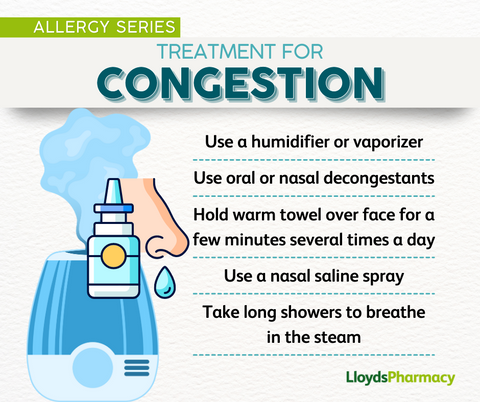Nasal Congestion from Allergies: Your Guide to Relief

Seasonal allergies can turn the simple act of breathing into a challenging endeavor. As spring blossoms or the autumn leaves fall, nasal allergies can become persistent. This can affect your daily life and well-being.
At LloydsPharmacy, we understand the impact of allergic reactions on your health. We're here to guide you through effective strategies to alleviate congestion and reclaim your comfort.
What is Allergic Sinusitis?
Allergic sinusitis, commonly seen in early childhood, occurs when exposed to allergens like dust, pollen, smoke, and animal dander. Those with a family history of allergic sinusitis may be more sensitive to certain foods and indoor/outdoor allergens.
Allergies don't emerge at birth but develop after repeated exposure to allergens. Sinusitis can be either acute - lasts less than four weeks or chronic (long term - lasting more than eight weeks).
Symptoms of Allergy Sinusitis:
Allergic sinusitis is occasionally mistaken for nonallergic sinusitis because they share similar symptoms. One notable distinction is that nonallergic sinusitis typically doesn't lead to an itchy nose, eyes, or throat. Allergic sinusitis symptoms typically change with the seasons and may include:
- Nasal Congestion: A feeling of stuffiness or blockage in the nasal passages.
- Runny Nose: Excessive production of clear, watery mucus.
- Sneezing: A reflex that removes irritants from your nose or throat.
- Itchy or Watery Eyes: Irritation and discomfort in the eyes are common allergy symptoms.
- Fatigue: The body's response to constant inflammation and immune system activity.
- Sinus Pressure: Headache, tenderness, pain, swelling and pressure around the forehead, cheeks, nose and between eyes.
- Taste and smell: A reduced sense of smell and taste.
Managing Allergy Nasal Congestion:
To manage mild seasonal allergies and reactions to pet dander, the most effective approach is avoidance. However, it's not always possible to avoid all allergens. Exposure to certain triggers may be difficult to avoid throughout the year.
Treating nasal congestion can include:
- Over-the-Counter Medications:
- Antihistamines: Combat histamine release to reduce allergy symptoms.
- Decongestants: Temporarily relieve nasal congestion by narrowing blood vessels.
- Decongestant Nasal Sprays:
- Steroid nasal sprays: Reduce inflammation in the nasal passages and clears the feeling of a stuffy nose.
- Saline nasal sprays: Flushes out allergens and moisturises nasal passages.
- Allergen Avoidance:
- Keep windows closed during high pollen seasons.
- Use air purifiers to filter out allergens.
- Wash bedding and curtains regularly to eliminate dust mites.
- Hydration and Steam:
- Stay hydrated to help thin mucus.
- Use a humidifier or take steam showers to ease congestion.
- Allergy-Friendly Lifestyle:
- Choose hypoallergenic bedding and pillows.
- Regularly clean and vacuum living spaces to reduce allergens.
- Practice regular hand hygiene by washing your hands frequently.

Expert Advice at LloydsPharmacy:
Visit your local LloydsPharmacy for helpful advice and a wide range of allergy relief products. Our knowledgeable pharmacists can help you choose the right medications, nasal sprays, and lifestyle adjustments.
With the right strategies and products, you can manage and alleviate symptoms effectively. Visit us today for expert guidance on conquering allergy congestion and enjoying a healthier, happier life.


